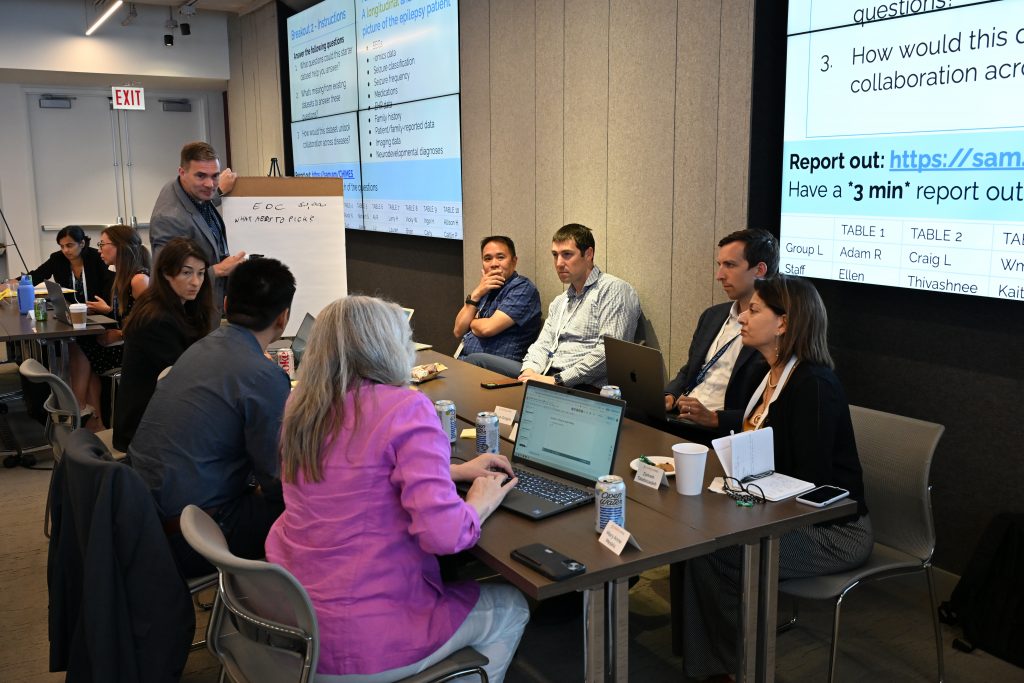
For families navigating the complex world of rare monogenic epilepsies, the challenges are profound. Despite the devastating impacts of these diseases, our scientific understanding and ability to treat them effectively remains frustratingly limited. One primary obstacle to research is the inherent difficulty of studying “orphan diseases” that affect small populations, compounded by data isolated in institutional silos.
At Data for the Common Good, we’ve seen firsthand how breaking down these barriers can accelerate discovery. Our work with the Pediatric Cancer Data Commons has demonstrated the transformative power of collaborative data sharing for rare diagnoses. Now, with support from the Chan Zuckerberg Initiative, we have the opportunity to work with experts, advocates, and families in the rare epilepsy community to develop a similarly transformative approach for these difficult-to-study diseases.
Two days of collaboration
The Chicago Monogenic Epilepsy Summit (CHIMES), held July 13-14, 2025 at MATTER Chicago, represented the culmination of months of community engagement. After extensive discussions with potential data and knowledge contributors, followed by a public webinar introducing the project to the broader epilepsy community, our next step was to bring together stakeholders in person to lay the foundation for a new collaborative framework. A total of seventy researchers, clinicians, patient advocates, and data scientists representing fifty different organizations came to meet in Chicago with a shared recognition that the current patchwork of isolated efforts is not serving patients well enough.
The summit’s first day focused on understanding where we are now and envisioning where we could go. Through lightning talks and collaborative breakout sessions, participants compiled a picture of the research landscape, sharing current efforts, challenges, and opportunities. The day was capped off by a keynote talk from Susan and David Axelrod, founders of CURE Epilepsy, who brought the patient perspective front and center.
Day two focused on practical implementation and developing a plan to move forward. Participants self-selected into breakout groups to discuss key factors critical to success: scientific impact (what tough questions could we answer with better data?), funding models (how can we ensure this work is sustainable?), data (where are the data now, and what will we need to do to combine it interoperably?), and governance (how should the group make decisions about data access, use, privacy, and more?).


A path forward
Over more than sixteen hours of intensive collaboration and discussion, CHIMES participants built stronger relationships and identified new opportunities. In follow-up polling, the large majority of participants were interested in sharing data and committed to continuing to work together. To this end, next steps for the group include completing a comprehensive landscape analysis to map existing resources and gaps, followed by convening an international summit to expand involvement beyond the United States. Two planning groups are forming to tackle key foundational work: a Governance group to establish the policies and procedures that will enable trusted data sharing, and a Data Dictionary group to develop the standardized models necessary to make diverse datasets interoperable. We will reconvene at the American Epilepsy Society meeting this December in Atlanta, maintaining momentum while building on the relationships forged at CHIMES.
The challenges facing rare epilepsy research—small patient populations, limited commercial incentives, incomplete data, fragmented efforts—are precisely why collaboration is so powerful. With diverse stakeholders, success in this effort will require a sustained commitment to working together with a consensus-based approach, keeping benefit to patients at the forefront. The enthusiasm and dedication demonstrated at CHIMES show that this community is prepared to meet these challenges and build a transformative resource to power epilepsy research and care.


CHIMES
by the numbers
2 days
70 participants (plus the D4CG team)
50 organizations represented
18 lightning talks
7 breakout discussions
16+ hours of collaboration
